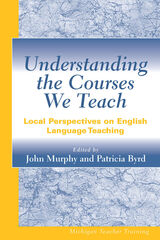4 books about English Language Teaching

Decentering Advocacy in English Language Teaching
Global Perspectives and Local Practices
Kate Mastruserio Reynolds, Grazzia Maria Mendoza Chirinos, Debra Suarez, Okon Effiong, and Georgios Kormpas
University of Michigan Press, 2024
Advocacy has been an important part of English language teaching, teacher training, and the experiences of individual students. By bringing together ELT advocates that represent diverse continents and countries, Decentering Advocacy in English Language Teaching highlights global efforts in advocacy as it provides an overview of best practices for English language teaching and learning.
In each chapter, an ELT advocate describes the need for their project, the steps they took, the challenges they faced in their particular context, the parameters they needed to work within, and how they worked within these constraints to achieve their goals. These stories offer insight into classroom and school focused efforts as well as social projects, and touch upon contexts in which educators may feel that they cannot engage in overt advocacy movements. With chapters focused on Africa, East Asia, the Middle East, and Latin America, the volume contributors identify patterns based on what has worked well transculturally and in sociopolitically constrained contexts to develop effective principles and practices. By bringing many different advocacy efforts and the latest advocacy research together, Decentering Advocacy in English Language Teaching identifies recognizable standards that can take the onus off of individual advocates to reinvent the wheel.
In each chapter, an ELT advocate describes the need for their project, the steps they took, the challenges they faced in their particular context, the parameters they needed to work within, and how they worked within these constraints to achieve their goals. These stories offer insight into classroom and school focused efforts as well as social projects, and touch upon contexts in which educators may feel that they cannot engage in overt advocacy movements. With chapters focused on Africa, East Asia, the Middle East, and Latin America, the volume contributors identify patterns based on what has worked well transculturally and in sociopolitically constrained contexts to develop effective principles and practices. By bringing many different advocacy efforts and the latest advocacy research together, Decentering Advocacy in English Language Teaching identifies recognizable standards that can take the onus off of individual advocates to reinvent the wheel.
[more]

Social-Emotional Learning in English Language Teaching
Luis Javier Pentón Herrera and Janine J. Darragh
University of Michigan Press, 2024
In an era where the world feels increasingly interconnected yet divided, Social-Emotional Learning in English Language Teaching unveils the profound impact of incorporating social-emotional learning (SEL) into language education. With compelling narratives and relatable examples, the authors showcase how emotional intelligence, empathy, and well-being are not just buzzwords, but essential elements for thriving in today’s global community. Through the lens of language education, they introduce the concept of affective communicative competence and advocate for a practice of responsible well-being that aims to support the holistic well-being of educators and learners. Blending meticulously researched theory with practical applications, the book is structured to facilitate both comprehension and application through practical SEL activities or reflective questions. As a critical resource for educators, researchers, and policymakers aiming to enrich the language-learning landscape, Social-Emotional Learning in English Language Teaching equips practitioners with the tools to foster environments where social-emotional and linguistic growth can flourish in tandem.
[more]

Two Centuries of English Language Teaching and Learning in Spain
1769-1970
Alberto Lombardero Caparrós
Amsterdam University Press, 2019
This book provides an exhaustive historical account of how the English language was taught and learnt in Spain over two centuries. Since its origins back in 1769 with the publication of San Joaquín de Pedro's 'Gramática inglesa' until 1970, a key year in European and World affairs. A period of time ample enough to accurately gauge the impact of this social phenomenon against the backdrop of social and political unrest which looms over the whole period but also with scientific breakthroughs that shaped our modern world. The history of ELT runs parallel to those events adopting diffferent mainstrem trends ranging from the Traditional or Latin-like approach to foreign language teaching to the so-called Grammar-Translation Method and the Direct or Oral Method. However, special attention is also given to 'minor' trends such as Ecclecticism which constantly overlaps the mainstream trends. This book is the first to take a close look at how the English language was taught and learnt in Spain for a two-century period when the French language was the Spaniard's first choice when it came to learning a foreign language.
[more]

Understanding the Courses We Teach
Local Perspectives on English Language Teaching
John Murphy and Patricia Byrd, Editors
University of Michigan Press, 2001
Understanding the Courses We Teach is a collection of pieces by teachers about actual teaching situations. This volume provides current and prospective ESL teachers with the opportunity to examine experienced teachers' ways of addressing locally situated issues of teaching and learning within ESL and EFL classrooms. By focusing on individual teachers' discussions of instructional plans, decisions, and experiences in specific courses, this collection complements other training and development resources, such as methods-course textbooks.
Individual chapters are rich in descriptive details and resonate with the contributor-teachers' personal investment in teaching. John Murphy and Patricia Byrd have arranged these chapters in four thematic clusters, the first dealing with general purposes instruction, including workplace literacy, community-based ESL, and courses designed for rich recent immigrants; the second with the teaching of English as a foreign language; the third with university credit-bearing courses focused on the teaching of English for academic purposes; and the fourth with noncredit university-affiliated courses offered through intensive English programs.
The contributors represent a variety of educational settings and many different countries and include many of the most well-known researchers in the field.
.
Individual chapters are rich in descriptive details and resonate with the contributor-teachers' personal investment in teaching. John Murphy and Patricia Byrd have arranged these chapters in four thematic clusters, the first dealing with general purposes instruction, including workplace literacy, community-based ESL, and courses designed for rich recent immigrants; the second with the teaching of English as a foreign language; the third with university credit-bearing courses focused on the teaching of English for academic purposes; and the fourth with noncredit university-affiliated courses offered through intensive English programs.
The contributors represent a variety of educational settings and many different countries and include many of the most well-known researchers in the field.
.
[more]
READERS
Browse our collection.
PUBLISHERS
See BiblioVault's publisher services.
STUDENT SERVICES
Files for college accessibility offices.
UChicago Accessibility Resources
home | accessibility | search | about | contact us
BiblioVault ® 2001 - 2024
The University of Chicago Press









